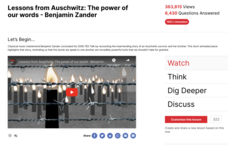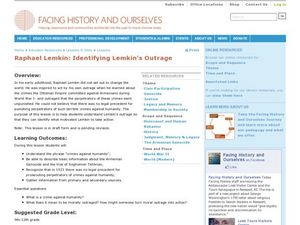Curated OER
WAR child Canada's: GENOCIDE
High schoolers identify reasons genocide occurs through group research into specific Genocide incidents of the 20th century. They put into perspective why an organization such as the United Nations is necessary by introducing them to one...
Curated OER
Teach About the Holocaust To Prevent Acts of Hate
Invest the time to study personal histories, poetry, and movies about the Holocaust so learners can grasp the plight of the individual.
Curated OER
Genocide, Sovereignty, Humanitarian Intervention and Accountability
Twelfth graders examine the attempts by various countries to genocide their members. In groups, they compare and contrast the responses by the other countries of the world to stop the genocide. They also identify cases in which the...
New York State Education Department
Global History and Geography Examination: June 2011
People in Ukraine, Rwanda, and Cambodia have all faced challenges to their human rights and even genocide. Using primary and secondary sources, scholars evaluate these challenges and the international community's role in them. The...
Curated OER
The Norman Yoke
Define the causes and conflict associate with the Battle for Hastings. Each slide presents basic information on battles, castles, and Genocide which occurred around 1066. The information is at times obscured by images and focuses heavily...
Curated OER
What Concepts are being presented
World War II, WWII, the Holocaust, the Rise of the Nazi Empire, Concentration Camps, the effect on children. The first 9 slides are of images and scenes of WWII, Black and white photography Slides 10 to 20 show present day photos of...
Mountain View High School
World War I Research Project
Here is a fantastic World War I research project that includes clear guidelines for topic choice, guiding questions, and suggested presentation products. Research subjects range from battles of the war, trench warfare, and weaponry, to...
TED-Ed
Lessons from Auschwitz: The Power of Our Words
Some words are best left unspoken. Words matter, according to Benjamin Zander, conductor, teacher, and lecturer. To illustrate his point, Zander recounts a story told to him by a survivor of Auschwitz. As a result of her experience...
Curated OER
Rwanda: You Go, Girls
Students examine the genocide that took place in Rwanda in 1994 and focus the post-genocide success of women. They study websites to examine how women are challenging their traditional roles in Rwandan society.
Curated OER
Building a Peace
Students take a closer look at the rebuilding of Rwanda. In this current events activity, students review the genocide in the country during the 1990's and perform role plays that require them to determine how to rebuild a nation after...
Facing History and Ourselves
Raphael Lemkin: Identifying Lemkin's Outrage
Students examine World War I war crimes. For this world history lesson plan, students use primary and secondary sources to research Armenian genocide and the trial of Soghomon Tehlirin.
Echoes & Reflections
Perpetrators, Collaborators, and Bystanders
After the Holocaust, the world grappled with how to bring justice to the Nazis. But what to do with the thousands—if not millions—who allowed it to happen? Young historians consider the issues of guilt, collaboration, and responsibility...
Curated OER
Holocaust: Voice of the Children
A picture is worth a thousand words. A visual account of the Nazi Empire, past and present scenes of WWII Concentration Camps, and the children of the Holocaust are presented in this slide show. Image heavy and graphic in nature, this...
University of Southern California
Persecution of the German-Jews: The Early Years - 1933-1939
Young historians learn about the dehumanization process of stripping German Jews of basic, fundamental rights prior to the genocide of European Jews in the 1940s. Learners watch video clips of survivors who recount such events...
Curated OER
Nation Building
Ninth graders examine the role of the United States in nation building. In this World History activity, 9th graders evaluate the role of the United States in building nations in other parts of the world.
DocsTeach
Before and After Carlisle School
White reformers thought they were "killing the Indian" to "save the man." Native children were taken from their parents and placed at boarding schools, such as the Carlisle School. Using a comparative photo analysis of children before...
Curated OER
A Study of Genocide and Project for Rememberance
Tenth graders examine the mass execution of Ukranian Jews by the Nazis at Babi Yar through a variety of sources, including: music, poetry, primary sources and photographs. They also design a memorial for the victims.
Curated OER
Stereotypes in The Diary of Anne Frank
Before reading Anne Frank's diary, discuss stereotypes with your class. This guide is a great prereading activity; pupils complete a list of incomplete sentences in order to showcase common stereotypes. Then, they complete the seven...
Curated OER
The History of the Holocaust From A Personal Perspective
Students research and identify how Holocaust events affected lives of real people who lived in Europe from 1933 through 1945 and after, and create original artwork, poetry, and essays that reflect understanding of Holocaust, and its...
Echoes & Reflections
The Children and Legacies Beyond the Holocaust
Using video testimony, primary source documents that detail international agreements, and structured discussions, learners consider the precarious position of children during the Holocaust and other international conflicts, and how to...
Echoes & Reflections
The Ghettos
Young historians examine primary sources, including diaries, poems, and photographs, to consider the conditions in the ghettos and how they fit into the escalation of the Third Reich's plot against the Jewish people.
Echoes & Reflections
Rescuers and Non-Jewish Resistance
What does it mean to be a rescuer during the time of the Holocaust? Learners consider the role of those who resisted the Nazi invasions, including hiding Jewish people, throughout Europe. Activities include listening to the testimony of...
Echoes & Reflections
Studying The Holocaust
While many young scholars are familiar with the Holocaust, they may not understand the specific history that led to the unprecedented atrocity. The first lesson in the unit helps teachers gauge their pupils' background knowledge. A...
Echoes & Reflections
Survivors and Liberators
The end was just the beginning. The period immediately after the end of World War II and the Holocaust is often called "The Return to Life" as survivors looked to reunite and recreate broken families and shattered lives. A two-lesson...
Other popular searches
- Genocide in World History
- Armenian Genocide
- Rwanda Genocide
- Genocides of 20th Century
- Genocide Convention 1948
- Yugoslavia Genocide
- Rwandan Genocide
- Modern Day Genocide
- Genocide in Sudan
- History of Genocide
- Cambodia Genocide
- Darfur Genocide

























